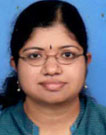
Focus of Research :
- Fish genetics
- Molecular ecology and eco-genotoxicology
- Marine Biodiversity and conservation
Background :
I graduated in fisheries science from College of Fisheries, Panangad, completed my masters’ degree in Mariculture from CMFRI, Kochi and carried out doctoral studies at University of East Anglia, UK. I worked intensively on reef corals of Gulf of Mannar and Palk Bay with a view to gain insights into their biodiversity, taxonomy and ecology. The effect of genotoxic chemicals on aquatic ecosystem and the role of sex in shaping evolutionary adaptations were studied using matrix population modeling in Artemia. Presently my research is focused on population genetics of fishes and its relation to climatic fluctuations in the Indian ocean.
Education :
- PhD 2012 University of East Anglia, UK
- MFSc 2001 Mariculture, CMFRI, Kochi (CIFE, Mumbai)
- BFSc 1999 Fisheries Science, College of Fisheries, Panangad (Kerala Agricultural University)
Current Research Projects :
| No | Title | Funded By |
| 1 | Genetics, Genomics and Biotechnological applications in mariculture and fishery resource management | ICAR- CMFRI |
| 2 | Health management in selected finfish and shell fish for mariculture and aquariculture and bioprospecting from marine resources | ICAR- CMFRI |
| 3 | Studies on the genetic stock structure of Indian mackerel, Rastrelliger kanagurta along the Indian coast | FAO-BOBLME |
| 4 | National Initiative on Climate Resilient Agriculture – Marine fisheries | ICAR-NICRA |
| 5 | Molecular approach to diet analysis in selected commercially important tunas | DST-SERB |
| 6 | Genetic tagging of spawning populations of Indian oil sardine, Sardinella longiceps along south west coast of India using microsatellite markers | KSCSTE- Kerala Biotechnology Commission |
Awards & Recognitions :
- Taylor and Francis-Commonwealth Best Journal Article prize 2014 - by commonwealth scholarship commission and Taylor and Francis journal– for the article published in Aquatic Toxicology journal (144-145: 66-74)
- Top 5 poster award 2014- for the poster presentation during international symposium on “ Marine Ecoystem, Challenges and Opportunities” (MECOS-2)
- Best paper award 2014 - by a committee of the Risk Assessment Specialty Section of Society of Toxicology, Pheonix, Arizona, USA for The paper published in (Ecotoxicol Environ Safety 91: 110)
- Commonwealth Scholarship by Commonwealth scholarship commission and British council 2008 - 2011– for PhD programme (3years) at University of East Anglia, UK
- Travel grant by University of East Anglia for participating in the seminar, “Environmental Pollution in a changing world”at Linnean society Lecture theatre, Burlington House, London from 13-14th September 2010
- Travel grant by Commonwealth scholarship commission for Participating in the “SETAC Europe 21st Annual Meeting in the Milano Convention Centre, Milan, Italy
- AKDS Gold medal for Best outgoing student of BFSc programme, 1994-1999
- ICAR Junior Research Fellowship
- Kerala Agricultural University Merit Award
Publications:
- Sandhya Sukumaran, Wilson Sebastian, A. Gopalakrishnan. 2016. Population Genetic structure of Indian oil sardine, Sardinella longiceps along Indian coast. Gene 576: 372-378
- Sandhya Sukumaran, Gopalakrishnan, Wilson Sebastian, P. Vijayagopal, S. Nandakumar Rao, Nevin Raju, Shihab Ismail, E.M. Abdussamad, P.K. Asokan, K.P. Said Koya and Prathibha Rohit. 2016. Morphological divergence in Indian oil sardine, Sardinella longiceps Valenciennes, 1847 – Does it imply adaptive variation? Journal of Applied Ichthyology, doi: 10.1111/jai.13060.
- Sandhya Sukumaran and Alastair Grant. 2013. Multigenerational demographic responses of sexual and asexual Artemia to chronic genotoxicity by a reference mutagen. Aquatic Toxicology. 144-145: 66-74.
- Sandhya Sukumaran and Alastair Grant. 2013. Effects of genotoxicity and its consequences at the population level in sexual and asexual Artemia assessed by analysis of inter simple sequence repeats (ISSR). Mutation Research 757: 8-14.
- Sandhya Sukumaran and Alastair Grant. 2013. Differential responses of sexual and asexual Artemia to genotoxicity by a reference mutagen. Is the comet assay a reliable predictor of population level responses? Ecotoxicology and Environmental Safety 91: 110-116.







